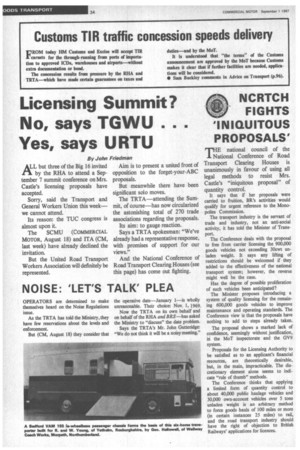NCRTCH FIGHTS 'INIQUITOUS PROPOSALS'
Page 36

If you've noticed an error in this article please click here to report it so we can fix it.
TIE national council of the National Conference of Road Transport Clearing Houses is unanimously in favour of using all legal methods to resist Mrs. Castle's "iniquitous proposal" of quantity control.
It says that if her proposals were carried to fruition, BR's activities would qualify for urgent reference to the Monopolies Commission.
The transport industry is the servant of trade and industry, not an anti-social activity, it has told the Minister of Transport.
The Conference deals with the proposal to free from carrier licensing the 900,000 goods vehicles not exceeding 30cwt unladen weight. It says any lifting of restrictions should be welcomed if they added to the effectiveness of the national transport system; however, the reverse might well be the case.
Has the degree of possible proliferation of such vehicles been anticipated?
The Minister proposes introducing a system of quality licensing for the remaining 600,000 goods vehicles to improve maintenance and operating standards. The Conference view is that the proposals have nothing to add to steps already taken.
The proposal shows a marked lack of confidence, seemingly without justification, in the MoT inspectorate and the GV9 system.
Proposals for the Licensing Authority to be satisfied as to an applicant's financial resources, are theoretically desirable, but, in the main, impracticable. The discretionary element alone seems to indicate "rule of thumb" methods.
The Conference thinks that applying a limited form of quantity control to about 40,000 public haulage vehicles and 30,000 own-account vehicles over 5 tons unladen weight is an arbitrary method to force goods hauls of 100 miles or more (in certain instances 25 miles) to rail, and the road transport industry should have the right of objection to British Railways' applications for licences.












































































































































